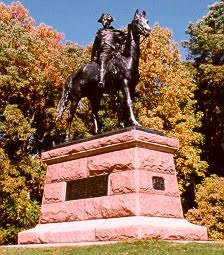General Anthony Wayne: In Other Words
By Cindy McGroarty
Issue the orders Sir, and I will storm Hell
-- Gen. Anthony Wayne to George Washington
Who was this General Anthony Wayne?
As a tour guide at Historic Waynesborough, I have asked myself that question. Not in the middle of the night, mind you—the way I might ask myself "why did I buy that double-walled, precision-welded 130,000 BTU rapid pre-heat gas grill?"—but in the lucid hours I’ve spent chasing down the facts of Wayne’s life and squinting at the bits and pieces of his mortal existence on view in the Chester County mansion where he was born.
For how do you measure a man like Wayne? A man who charged through the whirlwind of momentous times, hardly stopping long enough to finish a second pint of ale? Okay, Wayne finished many pints, we know that. In fact, a fondness for drink and rich food is perhaps the story behind his trouble with gout. But who was he really, at the core? Who was this complicated Shakespearean hero buffeted by fortune and his own human passions during his hour on the stage?
Ambitious, vain, quick to anger, a distant husband, an absent father, but also courageous, determined, a loyal friend, a fierce soldier, a keen and competent military mind. In short, a two-sided coin, much like any man, but larger than life for the part he played.
But don’t take it from me. Here’s what others have said:
“What he may be most qualified for, I know not…One thing I am certain of, he will never make a scholar, he may perhaps make a soldier…”
-- Gabriel Wayne, an uncle & school master to young Anthony (in a letter to Anthony’s father)
“In Wayne the spark of daring might flame into rashness, but it was better to have such a leader and occasionally to cool him to caution than forever to be heating the valor of men who feared they would singe their plooms in battle.”
-- General George Washington, commenting on Wayne’s service
“…by the by, an excellent officer [possessing a] military ardor…heated by the fire of the Modern Hero.”
-- General Nathanael Greene
“General Wayne had a constitutional attachment to the sword, and this cast of character had acquired strength from indulgence.”
-- Henry “Light Horse” Lee in his memoirs.
“Firm in resolution, as in constitution, industrious, indefatigable…fixed in opinion, unbiased in judgment…in some degree susceptible of adulation.”
-- Major William Eaton, on Wayne’s leadership in the Northwest Territory in the 1790s
“Anthony is mad!”
-- Jimmy the Drover, a private in Wayne’s regiment upon hearing Wayne wanted him whipped for a petty crime, one of several purported origins for how Wayne earned the moniker Mad Anthony
“I sincerely believe …it a Great deal more advantage to you than Disadvantage.”
-- Polly Wayne (Anthony's wife) in a 1792 sickbed letter to son Isaac before she died, regarding what she considered the beneficial effect on him of his father’s long absences
“I have Buried one of the fines’t little Boy’s perhaps in the world…I must forget I am to live.”
-- Margaretta Wayne (Anthony's daughter) expressing her grief in a letter to her father after the death of her infant son, to which Wayne did not reply for seven months
“…a weather-beaten, vulgar, affected old soldier...”
-- Williamina Cadwalader, friend of Wilmington socialite Mary Vining, on Vining's rumored engagement to Wayne in 1796, not long before Wayne’s death
“I rejoice that public honor is at last to be done to one of the heroes of the American Revolution—I love his name…he was a sincere patriot, a brave soldier, and what is more, an honest man.”
-- Dr. Benjamin Rush, at a ceremony to inter Wayne’s body beneath a stone monument in the graveyard at St. David’s Episcopal Church in Radnor



